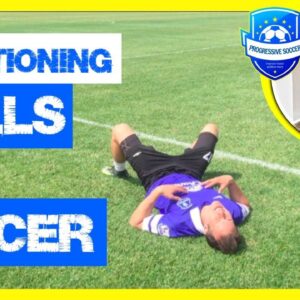Soccer conditioning is a process that helps players improve their physical fitness and prepare for the rigors of competitive play. A well-conditioned player will have more stamina, strength, and speed than one who is not conditioned properly. Soccer conditioning usually starts with a base level of fitness, then progresses to more specific training that targets the energy systems used in soccer.
-Warm Up
Warm up properly before your soccer conditioning sessions to help prevent injuries and improve your performance. A good warm-up will gradually raise your heart rate and increase blood flow to your muscles. It should also help you mentally prepare for the physical activity to come. Start with some light cardio to get your heart pumping, then do some dynamic stretching to loosen up your muscles. Finish with a few short sprints to get your legs moving.
-Cool Down
As your body temperature rises during exercise, it is important to allow time for your body to cool down afterwards. A cool down helps to gradually bring your heart rate and breathing back to normal, and can prevent dizziness or lightheadedness. It is also a good time to stretch out your muscles, which can help to prevent cramping or soreness later on.
To cool down after soccer conditioning, start by walking or jogging at a slow pace for 5-10 minutes. Then, do some static stretches for all of the major muscle groups that you worked during your session. Hold each stretch for 20-30 seconds and focus on deep, slow breathing. Once you are finished stretching, drink plenty of fluids to help your body recover.
-Drills
Drills are a great way to get through soccer conditioning. They help players to focus on specific skills and to improve their overall fitness. There are a variety of drills that can be used to improve different aspects of a player’s game. Some drills focus on speed and agility, while others work on ball control and passing.
Players should vary the drills they use to keep things fresh and to avoid boredom. Doing the same drills over and over again can make them less effective and can lead to players becoming disinterested. It’s also important to make sure that the drills are appropriate for the level of the team. If the drills are too easy, players will get bored. If they’re too difficult, players will get frustrated.
Using drills is a great way to improve a team’s overall performance. They help players to focus on specific skills and to get in better shape. By varying the drills and making sure they’re appropriate for the team’s level, players will stay interested and motivated.
-Running
Running is a great way to get through soccer conditioning and improve your game. It is important to warm up before you start running, and cool down after you finish. Start by walking for a few minutes to warm up your muscles. Then, start running at a slow pace and gradually increase your speed. If you start to feel tired, slow down and take a break. Remember to drink plenty of water to stay hydrated.
-Ball Work
If you are looking to improve your soccer conditioning, one excellent way to do so is through ball work. This type of training helps to improve your footwork, agility, and control, all of which are critical for success on the soccer field.
There are a variety of ball work exercises that you can do, and it is important to find ones that suit your level of ability and fit with your goals. For example, if you are looking to improve your footwork, you might do drills that involve dribbling the ball around cones or through small gates. If you are looking to improve your agility, you might do drills that involve changing directions quickly or jumping over obstacles.
Ball work is an excellent way to improve your soccer conditioning, and it should be a part of your training regimen. By incorporating this type of work into your practice, you can become a better and more well-rounded player.
-Nutrition
Nutrition is important for any athlete, but it is especially important for soccer players. Soccer is a very demanding sport, both physically and mentally. Players need to have the stamina to run up and down the field for the entire game, as well as the mental focus to make split-second decisions. Proper nutrition will help players to have the energy and focus they need to perform at their best.
There are a few things that soccer players should keep in mind when it comes to their diet. First, they need to make sure that they are eating enough calories. Soccer is a very high-intensity sport, and players can burn a lot of calories during a game. They need to make sure that they are replenishing those calories so that they have enough energy to play. Second, players need to make sure that they are eating the right kinds of foods. They need to eat foods that will give them sustained energy throughout the game, as well as foods that will help them to recover quickly after the game.
Soccer players need to pay attention to their diet in order to perform at their best. Eating the right kinds of foods will help them to have the energy and focus they need to succeed on the field.
